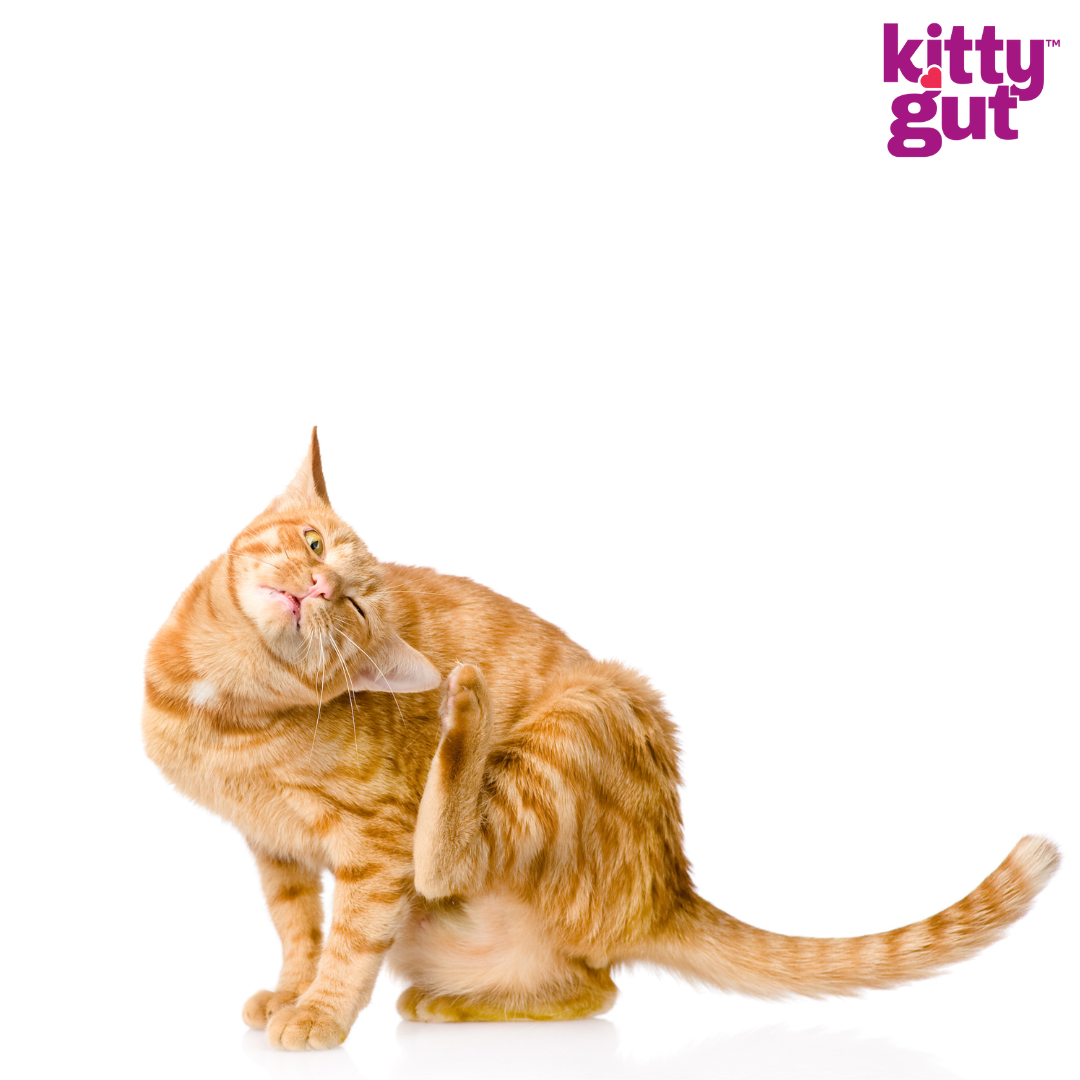
Cat Allergies: Causes, Symptoms, and Management
Share
Cat allergies are a common concern for many pet owners, and if you're a cat owner, you probably know that cats can have a wide range of these allergies, much like humans. These allergies can cause discomfort and health issues for your cat. In this blog post, we'll explore the various types of allergies that cats can develop, their causes, common symptoms, and how they can be managed or treated, including the essential aspect of maintaining proper gut health.
Types of Cat Allergies

Flea Allergy Dermatitis (FAD): Flea allergies are one of the most prevalent allergies in cats. Even a single flea bite can trigger an intense allergic reaction. Cats become sensitive to flea saliva, leading to severe itching, skin inflammation, and hair loss.
Food Allergies: Cats can develop allergies to specific ingredients in their diet. Common culprits include proteins like beef, poultry, fish, or grains. Symptoms may range from digestive issues (vomiting, diarrhea) to skin problems and ear infections.
Environmental Allergies: Cats can react to various environmental allergens such as pollen, mold, dust mites, and household cleaning products. Typical symptoms include sneezing, watery eyes, itching, and skin rashes.
Contact Allergies: Some cats can be allergic to materials they come into contact with, like plastic, rubber, or certain bedding. Symptoms often manifest as redness, itching, and hair loss at the point of contact.
Inhalant Allergies: Cats may be sensitive to inhaled allergens, such as cigarette smoke, perfumes, or aerosol sprays. These can result in respiratory symptoms or skin reactions.
Medication Allergies: Cats can be allergic to certain medications, leading to adverse reactions. Always inform your veterinarian of any prior medication-related issues.
Plant Allergies: A select few cats may react to specific plants, such as poison ivy or oak, which can cause skin irritation upon contact.
Insect Sting Allergies: Cats can also be allergic to insect stings, such as those from bees or wasps. Severe reactions can lead to swelling, hives, or difficulty breathing.
Recognizing Cat Allergy Symptoms
Identifying cat allergies can be challenging, as symptoms may vary. Look out for the following signs:
-
• Hair loss, especially around the face, neck, and tail
-
• Red, inflamed skin
-
• Bumps or hives
-
• Sneezing and watery eyes
-
• Vomiting and diarrhea
-
• Ear infections
-
• Respiratory issues
If you notice any of these symptoms, it's essential to consult your veterinarian for a proper diagnosis and treatment plan.
Managing and Treating Cat Allergies
In addition to the standard methods for managing and treating cat allergies, maintaining proper gut health in your cat can play a significant role in alleviating allergy symptoms. A healthy gut can enhance your cat's overall well-being and immune system, making them better equipped to deal with allergies.
High-Quality Diet: A cat's diet is closely linked to their gut health. Opt for high-quality cat food that contains essential nutrients, probiotics, and prebiotics. Probiotics are beneficial bacteria that support a healthy gut, while prebiotics are non-digestible fibers that feed these friendly bacteria. A balanced diet can contribute to a robust immune system and may help reduce the severity of allergies.
Probiotic Supplements: If your cat has a history of allergies, consider adding a probiotic supplement to their diet. Probiotics can help maintain a healthy balance of gut bacteria and strengthen the digestive system. Be sure to consult your veterinarian for recommendations on suitable probiotic supplements.
Allergy-Specific Diets: In cases of food allergies, your veterinarian may recommend hypoallergenic diets designed to minimize allergic reactions. These diets typically contain novel protein sources that your cat hasn't been exposed to, reducing the likelihood of allergic responses.
Avoid Overuse of Antibiotics: While antibiotics are necessary to treat bacterial infections, overuse can disrupt the balance of gut bacteria. Make sure to follow your vet's recommendations for antibiotic use and consider probiotic supplements during and after antibiotic treatments to help restore a healthy gut.
Reduce Stress: Stress can affect your cat's gut health and overall well-being. Minimize stressors in your cat's environment and provide a calm, safe space for them. This can help maintain a healthy gut and reduce the risk of allergies flaring up due to stress-induced inflammation.
Regular Vet Checkups: Regular visits to the veterinarian are essential for monitoring your cat's health, including their gut health. Discuss any concerns about allergies or changes in your cat's behavior or digestion with your vet during these checkups.
Hydration: Proper hydration is crucial for good gut health. Ensure your cat has access to clean, fresh water at all times to support digestion and overall well-being.
By incorporating these gut health practices into your cat's allergy management plan, you can help them maintain a strong immune system and minimize the impact of allergies on their daily life. Keep in mind that the specific approach to managing cat allergies, including gut health, should be tailored to your cat's individual needs and should always be discussed with your veterinarian to ensure the best possible care for your cat.
How KittyGut Can Help
While we've discussed various methods to manage allergies in dogs, an alternative approach to prevention is KittyGut. This 3-in-1 prebiotic, probiotic, and postbiotic supplement is designed to support total gut health in dogs. By promoting a healthy gut microbiome and improving nutrient absorption, KittyGut can complement the treatment of allergies. The prebiotics, probiotics, and postbiotics in KittyGut help in maintaining a balanced gut, which can have a positive impact on your dog's overall well-being when used alongside veterinary advice.
